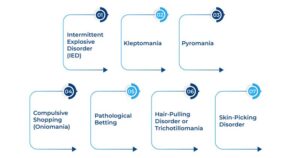Impulse Control Disorder is a health condition that causes an individual to have difficulties resisting impulsive urges to have the potential of injuring others or themselves. This is done without much considerations of the repercussion of the actions and later on feelings of remorse or guilt. Kleptomania (stealing), pyromania (setting fires) and intermittent explosive disorder (anger outburst) are common.
Moreover, the concrete cause may be brain chemistry or genetics or environmental. The first indicators can be restlessness, irritability, and repetitive dangerous behaviors. Therefore, the management of treatment usually involves the use of medication and treatment by a mental Health professionals who aims to control impulses and make better decisions to allow an individual to become better mentally and emotionally. Continue reading this interesting article till the end and get more interesting insights!
What Is Impulse Control Disorder?
Impulse control Disorder is a psychological issue that afflicts an individual, and one of them did not minimize sudden urges or surges easily despite being aware of the fact that it might harm him or someone else. Individuals who have this disorder would easily do things without reflecting on their actions or the consequences of their behavior. It includes an attempt to create a problem in their relationships, job, or daily livelihood. Therefore, the impulse control disorders include kleptomania or stealing, pyromania (igniting things/setting them on fire), and the intermittent explosive disorder or losing one’s temper. These dysfunctions are related to the ability of the brain to work and emotional control.
Similarly, we do not even fundamentally know why it tends to occur, though genetics, chemistry in the brain, and environment may be some factors. A change in lifestyle and even medication may assist the symptoms, given that they are diagnosed and treated very early. It can be very beneficial to visit a mental health expert when you or someone close to you exhibits the behaviors of this disorder. Book an appointment at MAVA Behavioral Health for effective treatment through medication. We are here to assist you every step of the way!
Signs of Impulse Control Disorder
These are the symptoms of the impulse control disorder:
- Regularly wishes to engage in behaviors that are dangerous or unsafe
- Doing without consideration of the consequences
- Experiencing tension or pressure before taking the act of the impulse
- A relief or pleasure following the act performed
- Inability to quit some habits despite the problems they cause
- Sudden violent eruptions of anger or aggressiveness
- Experiencing guilt, shame, or remorse following the act
Causes of Impulse Control Disorder
The reasons that can lead to impulse control disorder can be as follows:
- Risk may come as a result of a family history of mental illness disorders.
- Changes in neurotransmitters (serotonin, dopamine, etc.) may influence the regulation of impulses.
- The cause of impulsive behaviors may be a stressful environment, bad parenting, or the absence of guidance.
- Uncontrolled ADHD, bipolar disorder, or substance abuse can exacerbate problems with impulse control.
- Problems or delays in emotional development early in childhood can contribute.
Impulse Control Disorder in Children
In children, Impulse Control Disorder occurs when they are unable to resist themselves to engage in behavior they know is bad or detrimental to them. They can take swift action without considering its outcomes, such as hitting, shouting, stealing, and violating rules. This is not just typical mischievous behavior of a child of that age because it occurs regularly and leads to troubles at home, at school, and with peers. Children with such a disorder may have the urge to act, and though they may attempt to stop, it may become extremely difficult for them.
In most patients, impulse control disorder in a child could be attributed to brain development, emotional issues, or other disorders such as ADHD. Hence, these children can be upset, angry, or restless before their behavior, and after they feel bad or guilty. With an early diagnosis, an adequate treatment regimen, and parental and teacher guidelines, children are able to train their impulses to be under control.
Impulse Control Disorder in Adults
Impulse Control Disorder in adults is a mental health disorder whereby an individual is unable to resist the urge to do something despite the knowledge that such action may physically harm him or others. Such behaviors are impulsive, and they occur without contemplation of the effects. In an example, a person may spend too much money on shopping or engage in casino gambling, or express anger. It is not only about carelessness, but the brain has a problem suppressing some impulses to control, and they may be regretted later.
Additionally, adults with impulse control disorder can notice these behaviors, and they can disrupt their working relationships and their day-to-day life. The desire might appear too attractive, and it is extremely difficult to resist. This has the possibility of causing financial and emotional stress and lawsuits in the long run unless it is addressed. Thus, with proper diagnosis, treatment, and coping strategies, most individuals can be taught they resist their impulses and live better lives.
Impulse Control Disorder Examples
The examples of impulse control disorders are:
- Kleptomania- that is, the involuntary impulse to take what is not required, either to use or not.
- Pyromania, which is the inability to resist the desire to burn a thing, as of pleasure or breather.
- Compulsive Gambling- recurrent and persistent Gambling despite harm.
- Trichotillomania – this is the desire to pull your hair out, and later it becomes quite observable.
7 Types of Impulse Control Disorder

1-Intermittent Explosive Disorder (IED)
It entails sporadic episodes of anger or violence that exceed the circumstances. An individual can shout, smash, or even get physical. Such episodes normally make them feel guilty later.
2-Kleptomania
This is the recurrent desire in stealing things, even when they do not need or value them. It is not money or revenge; it is about the obsession that comes over one. After stealing, people usually have a feeling of relief, but they become ashamed after some time.
3-Pyromania
The propensity to purposefully set fire is impassioned in people with pyromania. They might get pleasure out of watching things burn, and they might feel elation or relief with it. This contrasts with arson since it is impulse-driven rather than the desire to harm to benefit.
4-Compulsive Shopping (Oniomania)
This type involves buying things excessively, often beyond one’s budget. The act of shopping gives temporary pleasure, but regret usually follows. It can lead to serious financial problems over time.
5-Pathological Betting
It is in such a scenario that an individual is not able to quit betting or playing games of chance even when they have lost money. They can be betting to “recover” losses. It may cause serious emotional, financial, and relationship problems.
6-Hair-Pulling Disorder or Trichotillomania
It is the desire to tear the hair on the head or eyebrows, amongst others. Individuals would do it to get rid of tension or stress. It may cause visible hair loss and distress.
7-Skin-Picking Disorder
This is the act of scratching skin again and again, and as a result, one may end up with wounds or scars. One does it as an anxiety reliever or as a comfort measure. It may lead to infection and low self-esteem in the long term.
Impulse Control Disorder Treatment
1. Medication Management
Impulse control disorder medication management pertains to the use of prescribed medications to aid in the normalization of brain chemicals that influence behavior and feelings. Depending on the type of symptoms, these medications can be antidepressants, mood stabilizers, or anti-anxiety medications. In addition, this aimed at minimizing the impulsive urges and enhancing self-control. Frequent follow-ups maintain the dosage and the kind of medication taken. This strategy is mostly used together with the treatment of improvement outcomes.
2. Psychiatric Assessment
The assessment process would include an in-depth examination by a mental health specialist to gain an understanding of the patient’s symptoms, their behavior, and medical history. It assists in defining the nature and the level of impulse control disorder. The evaluation may include medical interviews, questionnaires, and mental testing.
Final Thoughts
Impulse Control Disorder (ICD) is a mental disorder or syndrome where a person struggles to resist impulses or urges that are harmful to an individual or the general population, which may involve stealing, Gambling, or a fit of an irate mood. These are habits that can interfere with daily living, associations, and emotional well-being.
At MAVA Behavioral Health, we recommend medication management to manage the brain chemicals, which help take control of the impulses. So, our providers to prescribe you anti-anxiety, antidepressants, or mood stabilizers based on your symptoms, continuing to reduce the impulsive urges to enhance self-control. Our supportive and personal service will enable you to regain control over what you are doing and to lead a much more balanced and healthy life.
FAQs
What is Impulse Control Disorder?
The Impulse Control Disorder is a mental phenomenon in which an individual struggles to avoid anything harmful or constraining, although they are aware of the consequences.
What are popular examples of ICD?
These include kleptomania, pyromania, intermittent explosive disorder, compulsive Gambling, and trichotillomania.
What is the diagnosis of ICD?
To ascertain the determination of the diagnosis, a mental health expert does a psychiatric evaluation, which involves interviews and behavioral assessment.
Is ICD curable using medicines?
Yes, it can be nothing run-of-the-mill medication management that can help align brain chemicals, curb impulsive desires, and enhance self-control.
Does MAVA Behavioral Health treat ICD?
Indeed, multi-modal medication-based interventions exist, and MAVA Behavioral Health offers personalized medication-based applications to support symptom management.









